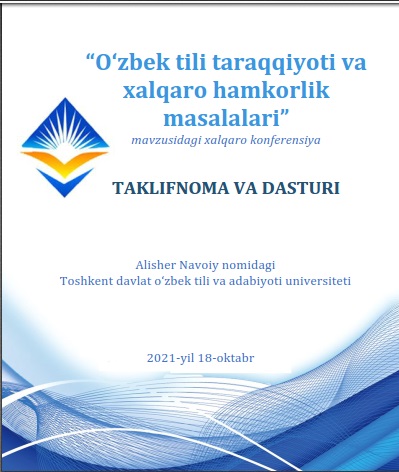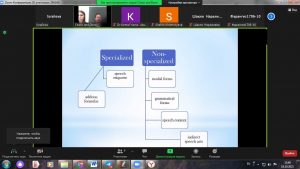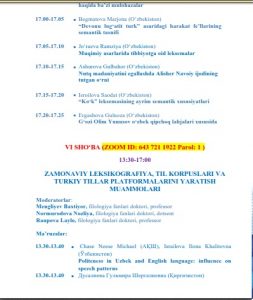


Maqolaning mavzusi:
Abstract: The article analyzes formulas of politeness of speech etiquette
in the Uzbek and English languages in a linguo-social context. The tasks of the work are comparison, analysis of formulas of politeness of speech etiquette in these languages, drawing up a summary conclusion. As well as differentiating similarities and differences. The
main lexical means of expressing politeness in English culture during greetings, gratitude, farewell, apology are highlighted and described. Particular attention is paid to the definition of the concept of «politeness».
Key words: Socio-linguistic competence, Eng
lish and Uzbek, politeness, structural points, speech patterns
Introduction. Politeness as a subject of linguistic study has repeatedly attracted the attention of local and foreign linguists. The problem of politeness as a linguistic phenomenon includes such issues as developing the concept of
politeness, studying the socio-psychological factors that determine the forms and functions of polite behavior, establishing the relationship between the category of politeness and the type of discourse, and describing the linguistic expression of the principles of politeness.
In linguistics, the categ
ory of politeness is considered within the framework of the general strategy of speech behavior
of communicants or when analyzing the features of speech acts, situations (apology, gratitude, compliment, expressions of sympathy, etc.) in a particular language. The classifications of politeness proposed by various authors demonstrate the dependence of the verbal representation of politeness on a wide range of factors. Each classification, developing different aspects of this phenomenon, has its purpose to determine what the communication participants should be guided by in order to successfully realize their communicative intentions. These classifications focus on the fact that different types of politeness have different ways of verbal implementation depending on the situation, interpersonal relations between the speaker and the addressee, and intercultural factors. According to N.G. Tyrnikova
, the etiquette structure of oral discourse is made up of the etiquette frame, etiquette frame and etiquette inclusions. The etiquette framework of discourse, the main elements of which are greetings and farewells, organizes communication and regulates the relationship between communicants. The eti
quette framework of discourse performs the function of creating and maintaining the comfort of communication and includes linguistic units that are traditionally not related to specialized etiquette means, but perform the function of maintaining contact inherent in etiquette means. The researcher attributes requests, apologies, gratitude to etiquette inclusions[1].
Main part. Distinguish between specialized and non-specialized means of speech etiquette. Specialized tools include speech etiquette and address formulas. Non-specialized speech etiquette means include the specifics of the choice and organization of speech content, etiquette use of grammatical forms, modal forms with reduce
d categorization, indirect speech acts, indirect designation of certain objects [2]. Both English and Uzbek language have their own set of politeness markers. It is very important for those who study English and Uzbek to use polite formality not only in business conversation, but also in everyday conversations on everyday topics. Generally, a “direct” question is considered rude and demanding, even if you add the magic word “please” at the end. For example, the sentences: “I want this a cup of tea” or “Where is the grocery?” require a rephrase: «Can you give me a cup of tea, please?» in English and “Iltimos, bir stakan choy bera olasizmi?” in Uzbek (Direct translations presupposes “Are you able to give me a cup of tea?” “Could
you please tell me where is the grocery?” in English and “Itimos d’okon qaerdaligini aytib yuboralasizmi?” in Uzbek (“ligini” is presupposed for “could”) As these examples show, one of the easiest ways to make a sentence sound more polite is to use modal verbs such as can, could, or may in English and “ligini”, “… olasizmi” in Uzbek. Being polite will help mutual cultural understanding and build contact faster. Uzbek and English are very polite languages where thankful constructions for the hairdresser have place to be for a bad haircut or apologize to someone who accidentally spilled coffee on their new suit. The main reason for such an expressive manifestation of politeness is the desire to avoid conflict at any cost. However, in certain situations, opposition of opinions is inevitable. Nevertheless, softening constructions are widely used to be polite both in English and Uzbek and not lose linguistic identity even when overwhelmed by negative emotions. In English-speaking countries and in Uzb
ekistan, it is considered impolite to reproach the person at fault. The most common way to behave is to “share” the blame, or even take the blame by saying “I’m sure it was my fault” or “Men ishonchim komil bu mening aybim”. This will help smooth out the conflict and not create an awkward situation[3]. While communicating with interlocutors, if a person does not fully understand the essence of what is being told it is usually not typical t use the phrase “What did you say?” in English or in “Siz nima deb aytingiz?” Uzbek Or “I don’t understand you” in English of in “Men sizni tushunmadim” Uzbek to ask again — the best way to do this would be a question like “Maybe I misunderstood you …” is a polite way of letting someone know that you didn’t understand the other person in both languages. Likewise, when a person does not understand the speaker, it is usually added “Perhaps I’m not making mysel
f clear” «Sorry!» in English and In “Kechirasiz” Uzbek Both in Uzbek and in english language countries do not tend to ask “What?” in English, or “Nima?” in Uzbek If they did not hear or understand the question — such a dry question is considered a manifestation of rudeness[4]. They will always answer: «I’m sorr
y» or «Pardon?»in English or “Kechirasiz”, “Uzr” in Uzbek. This feature of British politeness became so noticeable that even the British themselves realized it, although it is worth noting that they still do not give up this habit. Expression «Sorry!» considered a «national habit» of both cultures. This is the phrase that the British and Uzbek people say instinctively, even in situations where it would seem that there is nothing to apologize for. However, the fact remains: “Sorry” is not just one of the most “polite” words in the English or Uzbek language, but also incredibly versatile: it can be used to ask, clarify, express misunderstandings or apologize. Different speech patterns that are used by native speakers are quite similar in both languages due to very soft and polite cultures. The expression «Excuse me» or “Uzr” is used before a request or when they want to interrupt the interlocutor, if the speakers want to go through t
he line, go to the CV and leave their friends, and even when they need to answer the call. «Excuse me» is often used if a person sneezed, and after one of the communicants sneezed, the English-speaking nation will politely say «Bless you!» — «Be healthy!» “Sog’ bo’ling”, Although foreign linguists note that lately, they
are trying not to react in any way to the sneeze of the interlocutor. It is necessary to note one more lexical unit really, adding which the communication participant gives even greater politeness to the statement. I am really sorry! I’m sorry! Kechirasiz — Thus, we can conclude that the language means expressions of courtesy are different in every culture. They characterize both the individual speaker and his entire nation as a whole.
Conclusion. Politeness is a complex concept. It includes a certain set of lexical, grammatical and syntactic means that are inextricably used in the communicative act. We paid attention only to the lexical means of expressing politeness in greeting, apology, gratitude, farewell. We also realized that the category of politeness is characterized by a certa
in level of formality, which is expressed using vocabulary in a high and neutral tone. Linguistic means of politeness in informal situations are much less common. In both languages, sincere or insincere units of speech etiquette are difficult to determine from the written source. At the same time, paralinguistic means and non-verbal communication are also important. By facial expression, tone of communication, behavior, you can feel sincere or feigned «out of respect, official» politeness in a relationship.
